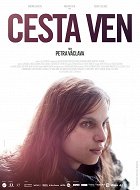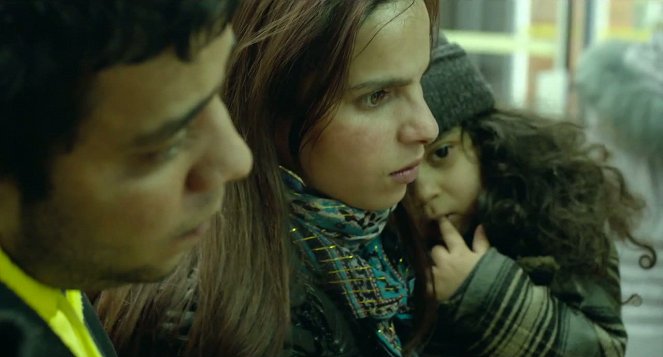Regie:
Petr VáclavDrehbuch:
Petr VáclavKamera:
Štěpán KučeraBesetzung:
Klaudia Dudová, David Ištok, Natálie Hlaváčová, Mária Zajacová, Milan Cifra, Sára Makulová, Přemysl Bureš, Zdeněk Godla, Julius OračkoInhalte(1)
Taking place in the Czech Republic in 2013, Cesta Ven is the story of a young Gipsy couple who wish to live an ordinary life – something impossible for Gipsies. Alone, they lead an uneven struggle against the hostile majority that denies them the right to a decent existence. And they must protect their dignity and love. (Verleiher-Text)
(mehr)Kritiken (6)
I was very curious to watch this supposedly best Czech movie of 2014. It’s not all fun and games to try and shoot something from the world of multicultural nomads. Not only does it reflect in their way of life, which is not very understandable to most of us, but also in the poverty they live in which is awfully difficult to escape. In any case, I loved that the director Petr Václav chose fairly fresh faces and non-actors to portray this difficult theme. Because their performances in front of the camera were absolutely incredible, which really won me over. The human element was a little worse, because I found it absolutely lacking. There’s no time to be humane when we have to fight for survival. The worst thing is that you’re not only brought down by people around you that you can’t seem to get rid of, but also by your own family. The Way Out is therefore an absolutely all-telling title. I watched this for the Challenge Tour 2015.
()
Ein Film, dessen Misserfolgsgröße (dramaturgische Undiszipliniertheit, Didaktik und schauspielerische /inszenationsbedingte Unbeholfenheit einiger Szenen) von der Wirtschaftlichkeit sowie Genauigkeit der Beobachtung, oder die präzise Fähigkeit, die beklemmende Fragmente der Realität zu erfassen, und die schlichte Tatsache, dass ein Mensch hierin nicht lediglich als Ergebnis sozialer, sondern auch psychologischer Grenzen zu verstehen ist. Darüber hinaus ist The Way Out weit entfernt von humanistischer Erpressung. Der Streifen ist manchmal sehr witzig, oftmals unerbittlich und genauso oft saugfähig. Der tschechische Film zahlt endlich seine Schulden gegenüber dem modernen Sozialdrama ab und lässt turbulente Versuche vom Typ My Dog Killer, El Paso oder Flower Buds weit hinter sich. The Way Out zeigt schlichtweg einen Ausweg auf, obwohl (er hier hin und wieder halbherzig) hinter dem kompromisslosen Verismus der Dardenne-Brüder sowie dem lyrischen Realismus von Bence Fliegauf zurückbleibt. [80%]
()
Films from the Roma environment are based on three main approaches. The first is exotic romanticization, which is evident in some films from Western Europe, especially France (although the most typical example is probably the Soviet film Gypsies Are Found Near Heaven). The second approach tends to depict the Roma world from activist positions, emphasizing racism and portraying the community as a victim. The third approach looks at this community through the frustration of the white rose and comments on internet discussions. The Way Out tried to do things differently, striving for realism and raw presentation with what it had to work with. It doesn't always succeed, as the screenplay could have been better, but the element of authenticity is noticeable and there was a great effort here to make an honest film. It is an attempt at an honest testimony, and I value that. Overall impression: 75%.
()
Die Roma-Thematik ist im tschechischen Film seit seinen Anfängen präsent, aber in den letzten Jahren ist sie viel stärker in den Vordergrund getreten. Es wird wahrscheinlich nie wieder die Poesie von Černý plamen oder Mein Freund Fabian erreichen, aber auch nicht die von Lerchen am Faden. Es liegt in der Natur dieser Menschen, und selbst wenn es jemanden unter ihnen gibt, der sich wirklich bemüht, ist Blut einfach dicker als Wasser.
()
Ich habe angenommen, The Way Out würde zu den besten Filmen des Jahres zählen. In meinem persönlichen Ranking schiebt sich der Film auf einen hübschen zweiten Platz, denn Fair Play wird nichts mehr von seinem ersten Platz verdrängen können. Anfangs musste ich mich etwas innerlich damit auseinandersetzen, dass Nichtschauspieler spielen, andererseits ist das eigentlich jedesmal besser, als wenn Schauspieler nicht spielen :-) Den gesamten Film trägt deutlich die Hauptdarstellerin, ihre Žaneta ist stellenweise fast unglaublich wegen ihrer Verbissenheit und Hartnäckigkeit, mit der sie immer versucht, ihr Leben zu verbessern und einen Ausweg zu finden. Ich kann jedoch nicht anzweifeln, dass es solch einen Menschen nicht gibt. Fast die ganze Zeit war ich erfasst von großer Hoffnungslosigkeit, Verzweiflung und Vergeblichkeit, was ich das letzte Mal bei Flower Buds erlebt habe. Und gerade dank Žanetas verbissenem Kampf dringen Hoffnungsschimmer in diese Verzweiflung. Und es fehlt nicht an Humor, die die bedrückende Atmosphäre etwas auflockern. Es wechseln sich hier stärkere und schwächere Momente ab, bei denen der Zuschauer zweifelt oder den Kopf schüttelt, doch der Gesamteindruck ist ganz sicher positiv. Petr Václav gehört zu den bemerkenswertesten tschechischen Regisseuren, und das Thema soziale Konflikte interessiert ihn sicher sehr. Ich befürchte, dass The Way Out in die Fußstapfen des Vorjahresfilms Like Never Before tritt, deshalb wünsche ich ihm viel mehr Zuschauer, auch auf FilmBooster finden sich nur 222 Bewertungen!
()
Petr Václav didn’t so much make me happy as piss me off. Although his The Way Out is very far from being tendentious and cannot be characterized in any other way than that it merely "describes or observes", when all’s said and done it is more of a psychological/family drama (from a foundation of social consciousness, of course), one that at times is unusually intimately emotional (which is why it pissed me off so much, because I was expecting something more generalizing). There were moments when I was truly not far from tears and had to repeatedly remind myself how well off I am (I went to college, I have a decent job, a car, an apartment, etc.). The only thing I had a bit of a problem with was the attractiveness of the main character (Klaudia Dudová is undoubtedly very pretty), not to mention her unusually high moral principles. Maybe it's just a result of my own limited perspective, but sometimes I found Žaneta just too cool. Otherwise, however, I would like to salute Petr Václav for how suggestively and sensitively he filmed a topic still very difficult to grasp. The non-actors didn’t bother me; on the contrary, the sometimes slightly clumsy natural acting deepened the authenticity of the work as a whole.
()

